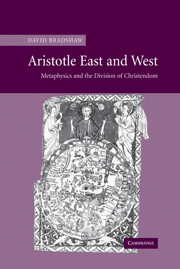Book contents
- Frontmatter
- Contents
- Preface
- 1 The Aristotelian beginnings
- 2 The Prime Mover
- 3 Between Aristotle and Plotinus
- 4 Plotinus and the theory of two acts
- 5 The Plotinian heritage in the West
- 6 Gods, demons, and theurgy
- 7 The formation of the eastern tradition
- 8 The flowering of the eastern tradition
- 9 Palamas and Aquinas
- 10 Epilogue
- Bibliography
- Index
8 - The flowering of the eastern tradition
Published online by Cambridge University Press: 22 September 2009
- Frontmatter
- Contents
- Preface
- 1 The Aristotelian beginnings
- 2 The Prime Mover
- 3 Between Aristotle and Plotinus
- 4 Plotinus and the theory of two acts
- 5 The Plotinian heritage in the West
- 6 Gods, demons, and theurgy
- 7 The formation of the eastern tradition
- 8 The flowering of the eastern tradition
- 9 Palamas and Aquinas
- 10 Epilogue
- Bibliography
- Index
Summary
The history of Christian thought in the East after Dionysius is often presented as a series of controversies: the Christological controversies, the iconoclast controversy, the filioque controversy, the hesychast controversy. Although this approach works well for describing the growth of Christian doctrine, it is less suited to uncovering the philosophical presuppositions that shaped the eastern Christian worldview. The question of where philosophy ends and theology begins within the eastern context is not one that has an easy answer, nor do we need to settle it here. It is sufficient to note that there are recognizable philosophical issues on which the authors of this period have a great deal to say: issues such as the status and meaning of nature; the relationship between body and soul, and the sensible and the intelligible; the way in which symbols and images represent their prototypes; the interconnection of theory and practice; person as a category irreducible to nature; and, above all, the nature of God and the possibility of human communion with the divine. On such topics the thought of the Christian East is best approached, not in terms of doctrinal history, but as the gradual working out of the fundamental revision of Neoplatonism begun by the Cappadocians and Dionysius.
In this chapter our aim is not to present a comprehensive history of eastern Christian thought even in its philosophical dimension. The thread we are tracing is energeia.
- Type
- Chapter
- Information
- Aristotle East and WestMetaphysics and the Division of Christendom, pp. 187 - 220Publisher: Cambridge University PressPrint publication year: 2004



